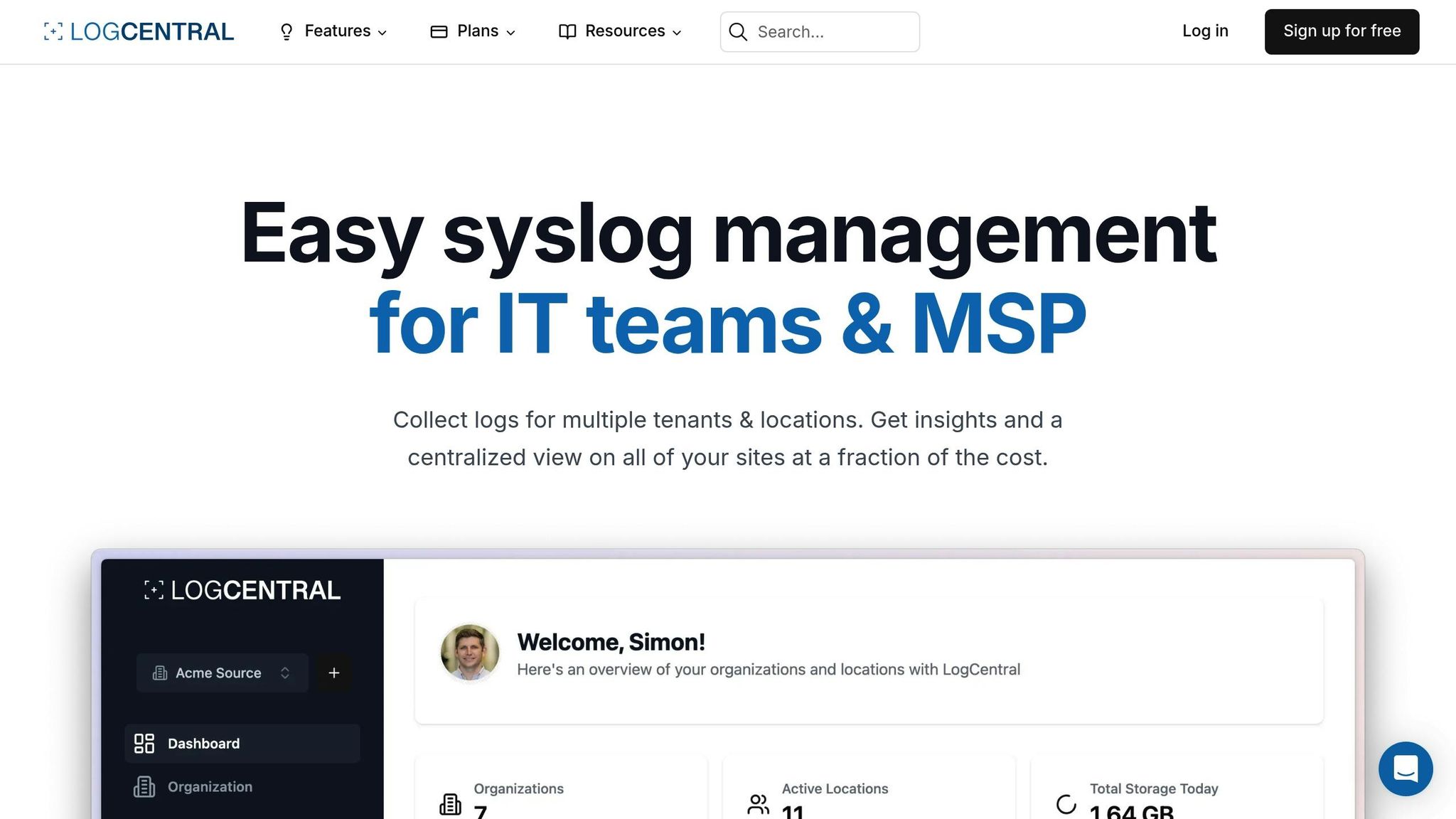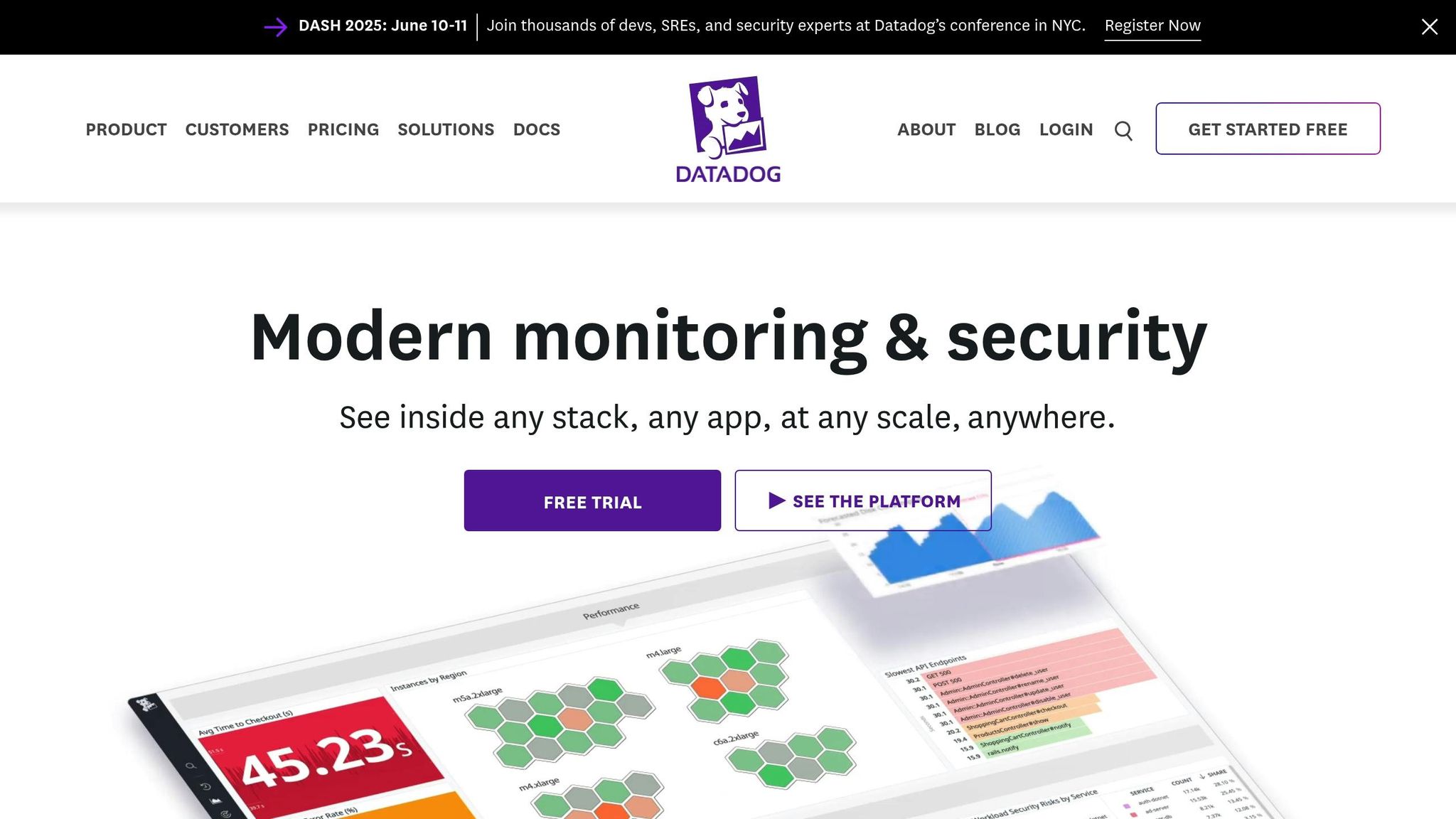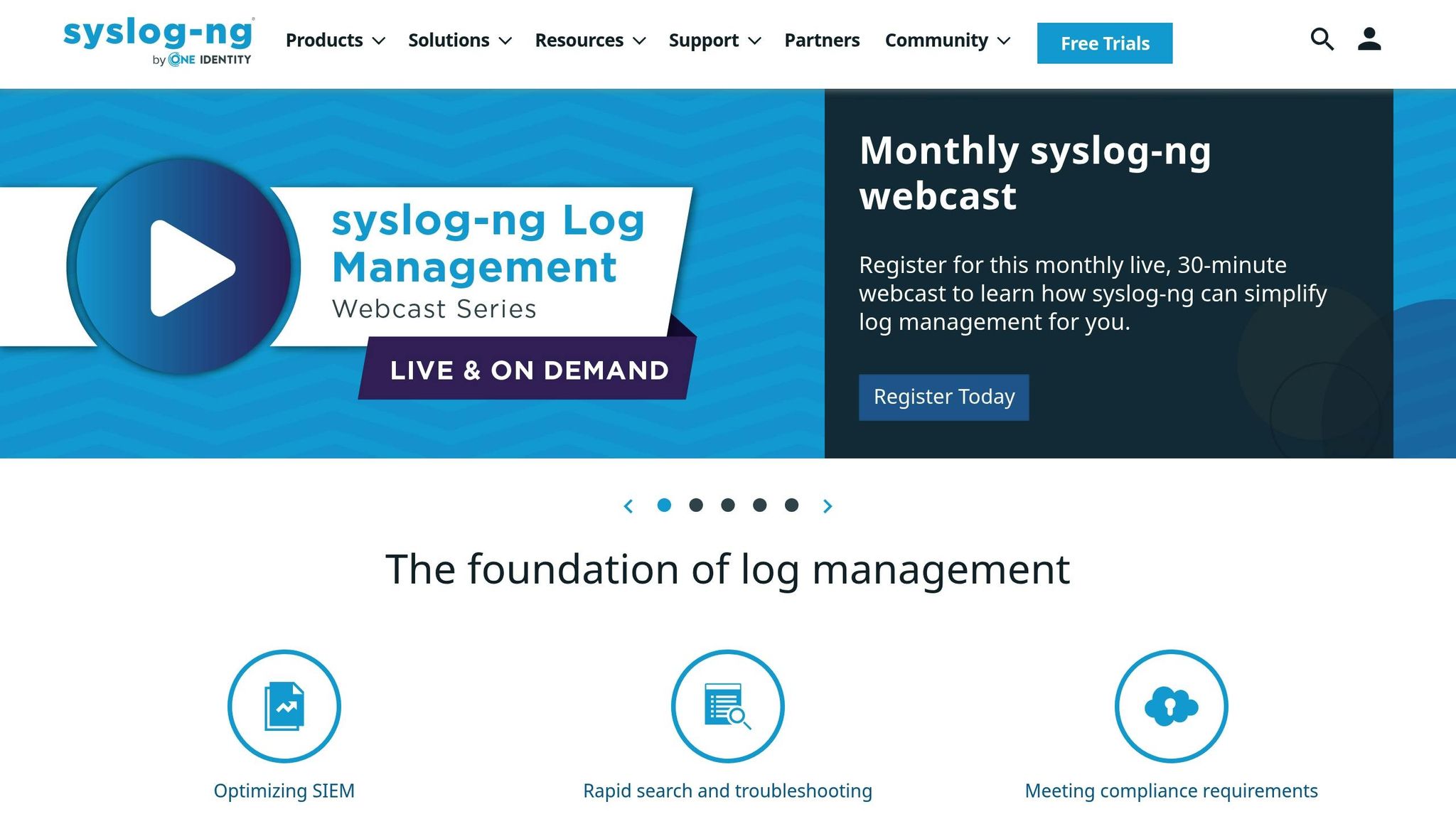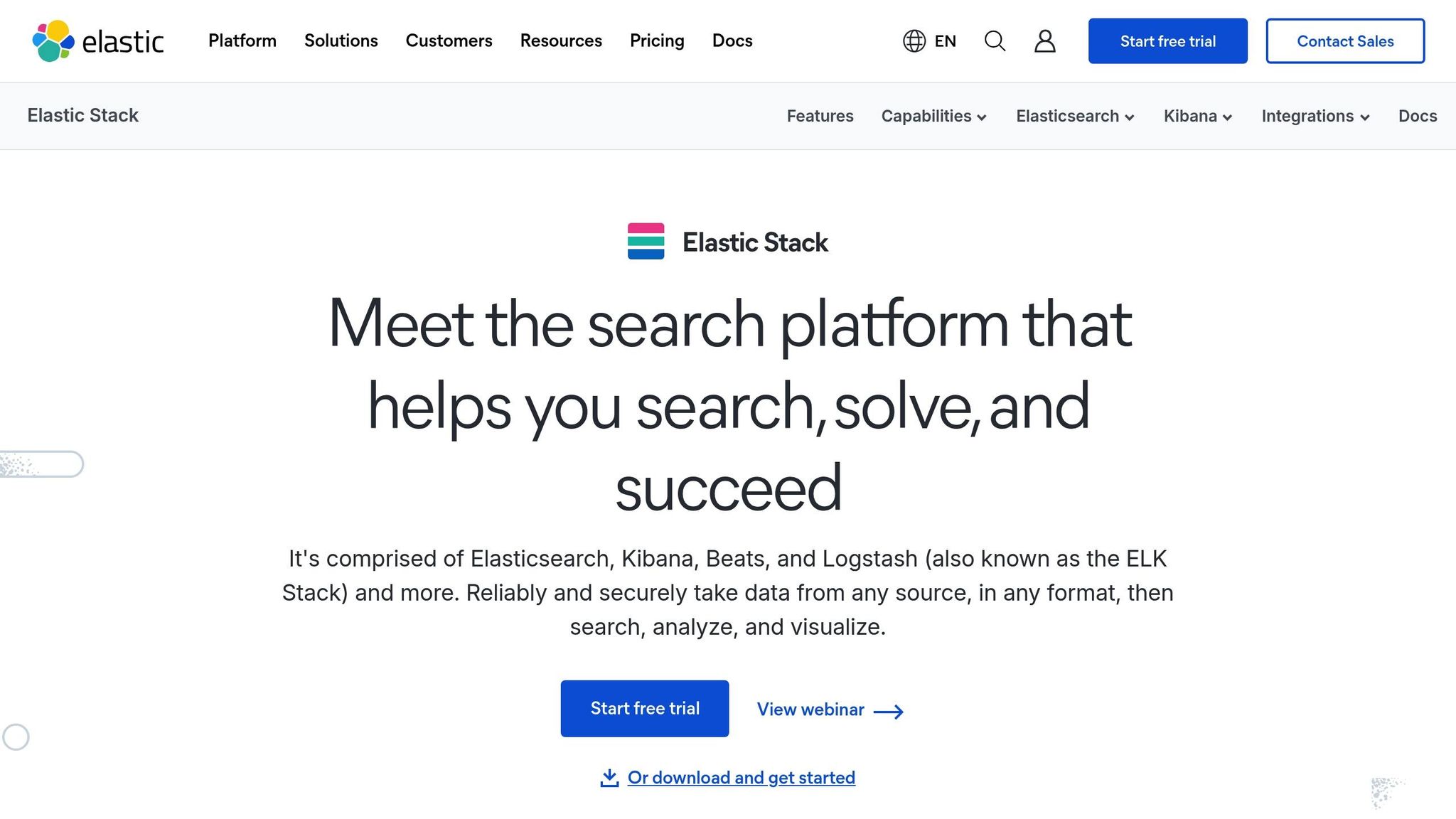
Top 5 Syslog & Log Management Tools EU SMBs Should Watch in 2025
Top 5 Syslog & Log Management Tools EU SMBs Should Watch in 2025
Managing logs while staying compliant with GDPR is tough for EU SMBs. Here's a quick guide to the top tools in 2025 that balance affordability, compliance, and performance:
- Graylog: Open-source, affordable, with GDPR-focused features like pseudonymization and EU-based storage. Free version available; enterprise starts at 1 150 €/month.
- LogCentral: EU-based, GDPR-native, designed for MSPs. Simple pricing starts at 15 €/month for 250 MB/day.
- Datadog: Cloud-native with a German data center for EU compliance. Pricing starts at 13,80 €/host/month.
- Syslog-ng: Self-hosted, scalable, and secure. Open-source with optional paid support.
- Elastic Stack: Flexible deployments (cloud or on-premise), GDPR-ready, starting at 14,70 €/month.
Quick Comparison
| Tool | GDPR Compliance | EU Data Residency | Pricing (€/month) | Key Strengths |
|---|---|---|---|---|
| Graylog | Limited | Yes | Free - 1 150+ | Open-source, fast search |
| LogCentral | Native | Yes (France/Germany) | 15 - 250+ | MSP-focused, simple pricing |
| Datadog | Full | Yes (Germany) | 13,80+/host | Cloud-native, strong integrations |
| Syslog-ng | Basic | Self-hosted | Free (support extra) | Scalable, full control |
| Elastic Stack | Full | Yes | 14,70+ | Flexible deployment, robust tools |
Each tool has strengths tailored to specific needs. Read on to find the best match for your business.
1. Graylog: Open-Source Log Analysis

Graylog has carved out a solid reputation in the log management world, boasting over 50,000 installations in 180 countries [1]. For small and medium-sized businesses (SMBs) in the EU, it offers an affordable and efficient way to manage logs.
One of Graylog's standout features is its powerful search functionality, which delivers impressive speed when working with large volumes of logs [1]. This makes it a strong contender for businesses handling substantial data loads.
For companies navigating GDPR requirements, Graylog includes several tools tailored for compliance:
- Field-level processing and retention policies
- Data minimisation and pseudonymisation
- Regional storage options for EU-based data
- Automated compliance reports and audit trails
Pricing Options for 2025
Graylog offers a tiered pricing structure, catering to different needs and budgets:
| Edition | Starting Price (€/month) | Key Features |
|---|---|---|
| Open Source | 0 € | Basic log collection, storage, and analysis |
| Operations | 1 150 € | Cloud-based deployment with advanced features |
| Security | 1 425 € | SIEM capabilities and threat detection |
| API Security | 1 380 € | Security monitoring focused on APIs |
While the open-source edition is free, it's essential to consider the potential costs of Elasticsearch deployment, especially with larger log volumes [2]. Additionally, technical know-how is required for setup, and visualization options may feel limited.
"Very low cost of ownership, particularly if you can get the Community (Free, Open-Source) version to meet your needs. I've implemented Graylog at multiple organizations for only the cost of hardware / storage." – Tim E., Hospitality [1]
Despite these challenges, Graylog continues to impress users, earning a value-for-money rating of 4.7 out of 5 and an overall rating of 4.6 out of 5 [1]. These scores highlight its ability to deliver a strong feature set at a reasonable price point.
2. LogCentral: EU-Based Syslog Platform

LogCentral is specifically designed for European SMBs and MSPs, with its infrastructure entirely hosted within the EU. Operating out of data centres in France and Germany, it ensures compliance with GDPR regulations and upholds data sovereignty requirements [4]. This European-centric approach is complemented by advanced MSP features and stringent security measures.
MSP-Centric Architecture
LogCentral is built with multi-tenancy in mind, making it a natural fit for MSPs. Its features allow MSPs to:
- Manage multiple client environments from a single, unified dashboard.
- Guarantee strict isolation of client data.
- Set tailored access controls using custom roles.
- Allocate costs efficiently on a per-client basis [3].
With a 99.9% uptime guarantee, supported by geo-redundant infrastructure, LogCentral ensures dependable log management for essential business functions [3].
EU Compliance and Security Features
| Security Aspect | LogCentral Implementation |
|---|---|
| Data Residency | EU-based (France/Germany) |
| Access Control | Role-based (RBAC) |
| Data Protection | Encryption at rest and in transit |
| Compliance | Native GDPR support |
| Security Testing | Regular assessments |
The platform enforces robust access controls, conducts frequent security tests, and emphasizes staff training to maintain high security standards [4].
Cost-Effective Pricing Structure
LogCentral employs a straightforward, node-based pricing model, offering savings of up to 50% compared to the traditional message-volume pricing approach [5].
Technical Considerations
Focusing on operational efficiency and security, LogCentral emphasizes technical log storage rather than personal data. This aligns with GDPR's data minimisation principles while still providing comprehensive logging capabilities [4].
3. Datadog: Cloud-Native Monitoring

Datadog has strengthened its footprint in Europe by opening a data centre in Germany, designed to address data residency and sovereignty concerns. This move ensures compliance with EU regulations while providing robust cloud-native monitoring solutions.
German Data Centre Benefits
The German data centre guarantees that all data remains within the EU, adhering to GDPR requirements [6]. This step enhances data protection and privacy for European users. Amit Agarwal, Datadog's Chief Product Officer, highlights the significance:
"We are committed to supporting our customers' security, privacy and regulatory compliance requirements worldwide. With this new EU region, customers will now have the choice of keeping their monitoring, analytics and log data in Europe for their infrastructure and applications." [6]
Beyond compliance, Datadog's platform delivers a wide range of technical features to support its users.
Technical Capabilities
Datadog's platform is packed with tools that cater to complex IT environments:
| Feature Category | Capabilities |
|---|---|
| Integration Coverage | Over 850 technology integrations |
| Infrastructure Support | Multi-cloud and hybrid environments |
| Monitoring Scope | Unified metrics, logs, and traces |
| Security Features | Alerts powered by machine learning, DevSecOps tools |
| Data Processing | Server-side parsing pipelines |
The platform also ensures strict separation of US and EU data, backed by a 99.8% availability SLA [8].
Cost Structure for SMBs
Datadog's pricing is designed to scale with usage, making it accessible for small and medium-sized businesses (SMBs):
| Plan Type | Annual Cost (€/host/month) | On-Demand Cost (€/host/month) |
|---|---|---|
| Pro | 13,75 | 16,50 |
| Enterprise | 21,10 | 24,75 |
| DevSecOps Pro | 20,20 | 24,75 |
| DevSecOps Enterprise | 31,20 | 37,60 |
For log management, pricing starts at €0,09 per GB monthly for processing, while retaining 1 million events for three days costs €1,46 [11].
Industry-Specific Solutions
Datadog tailors its offerings to industries like financial services, healthcare, retail, and manufacturing [9]. Its machine learning tools help detect anomalies and improve cloud performance [10].
The platform also incorporates data scrubbing and filtering features to meet strict protection standards [7]. With a unified dashboard, even smaller IT teams can manage their entire tech stack efficiently, gaining full visibility without the need for significant resources.
4. Syslog-ng: Self-Hosted Log Management

For organizations that require complete control over their log data, syslog-ng offers both Open Source and Premium Editions. These self-hosted solutions are designed to meet the needs of European SMBs, particularly those prioritizing data sovereignty, while delivering excellent performance and scalability.
Performance Capabilities
Syslog-ng is capable of handling large-scale log processing efficiently, even on standard server hardware. Here's a snapshot of its performance benchmarks:
| Configuration Type | Messages Per Second | Data Processing Rate |
|---|---|---|
| Multiple Plain Text Files | 590,000 | 220 MB/sec |
| Multiple Logstores | 560,000 | 210 MB/sec |
| TLS-Encrypted Connections | 565,000 | 210 MB/sec |
These results were achieved using real-world log messages ranging from 130 to 2,000 bytes in size [13], showcasing syslog-ng's ability to handle enterprise-level workloads with ease.
Enterprise-Grade Features
The Premium Edition of syslog-ng enhances its core functionality with features tailored for business-critical needs:
- Secure Storage: Logs are stored in encrypted, compressed, and time-stamped binary files.
- Access Control: Supports integration with LDAP and Radius databases for user management.
- Scalability: Capable of indexing up to 100,000 messages per second [14].
- Storage Capacity: Each appliance can manage up to 10 TB of uncompressed data [14].
Data Sovereignty Compliance
For European SMBs, syslog-ng's on-premise deployment options make it a strong choice for meeting GDPR requirements. Key compliance benefits include:
- Data Localisation: Full control over where log data is stored.
- Privacy Protection: Built-in anonymisation tools to safeguard sensitive information [15].
- Secure Transmission: TLS encryption ensures data remains protected during transit.
- Access Management: Granular user authentication and authorization controls.
A Principal Systems Engineer in the financial services sector shares their experience:
"syslog-ng PE is unmatched in feature set, stability and reliability. If you depend on logging for any business need then syslog-ng must be a part of your logging strategy" [12].
Optimisation Recommendations
To maximize the performance and scalability of your syslog-ng deployment, consider these optimization strategies:
- Architecture Planning: Configuring multiple sources and destinations improves scalability. For environments with thousands of concurrent connections, using relay instances before the main server can significantly boost performance [13].
- Storage Configuration: Compressed logstore files outperform plain text when handling high volumes of messages. A single central server can efficiently manage logs from over 5,000 source hosts [16].
- Filtering Optimisation: Stick to simple filters, such as facility or tag-based filtering, to maintain processing efficiency. Complex regular expressions can slow down performance by 40–45% [13], so they should be used sparingly.
An IT systems analyst from a retail company highlights syslog-ng's reliability:
"syslog-ng allows us to reliably collect and store messages from hundreds of systems" [12].
5. Elastic Stack: Multi-Purpose Log Tools

Elastic Stack offers a scalable log management solution tailored to European small and medium-sized businesses (SMBs), ensuring compliance with GDPR requirements. It blends advanced functionality with a focus on meeting EU-specific regulations [18].
Core Capabilities for SMBs
Elastic Stack provides several key features designed to address the needs of EU businesses:
Data Processing & Analysis
- Handles data from various sources in real time, with advanced search capabilities and built-in tools for enriching data.
Security & Compliance
- Supports role-based access control for secure data handling.
- Ensures compliance with GDPR standards, offering robust data protection measures [19].
Deployment Flexibility
Elastic Stack offers multiple deployment options, catering to different levels of control and scalability needs:
| Deployment Type | Management Level | Scaling Model | Pricing Model |
|---|---|---|---|
| Serverless | Fully managed | Automatic | Usage-based |
| Hosted Cloud | Managed | Manual | Resource-based |
| Self-managed | Custom | Custom | Infrastructure cost |
European Data Sovereignty
Elastic Stack stands out with its flexibility in deployment and a competitive starting price of around €14,70 per month. It ensures compliance with EU data residency requirements by allowing businesses to:
- Select regional providers to keep data within EU borders.
- Align with the Data Privacy Framework for processing EU/UK data [19].
Performance Insights
The platform enjoys high user satisfaction, with an overall rating of 4.6/5. Its features are rated at 4.6/5, while its value scores 4.5/5 [21].
Practical Implementation Tips
For European SMBs looking to implement Elastic Stack effectively, consider the following steps:
- Data Management: Start by inventorying your cloud data, especially sensitive customer information [20].
- Security Configuration: Apply security-by-design principles to meet EU data protection requirements [20].
- Monitoring Setup: Set up alerting features that integrate seamlessly with:
- Email notifications for critical events.
- Webhook services.
- Collaboration tools like Slack and Microsoft Teams [17].
With its robust features, strong compliance measures, and flexible deployment options, Elastic Stack is a solid choice for EU SMBs aiming to modernise their log management systems. Up next, we’ll compare its capabilities and pricing with other platforms.
Features and Pricing Comparison
Here’s a detailed look at the features, pricing, and compliance aspects of leading log management solutions tailored for EU-based small and medium-sized businesses (SMBs).
Core Features Matrix
| Feature | Graylog | LogCentral | Datadog | Syslog-ng | Elastic Stack |
|---|---|---|---|---|---|
| GDPR Compliance | Limited | Native | Full | Basic | Full |
| EU Data Residency | Yes | Yes | Yes (Germany) | Self-hosted | Yes |
| Multi-tenancy | Enterprise | Native | Yes | Limited | Yes |
| Access Control | RBAC | RBAC | RBAC | Basic | Advanced RBAC |
| Alerts | Advanced | Intelligent | Real-time | Basic | Advanced |
| Cloud Integration | Good | Limited | Excellent | Basic | Excellent |
This table highlights how each platform stacks up in terms of compliance, functionality, and integration options, helping you identify the best fit for your needs.
Pricing Structure (2025)
LogCentral
- Light: 15 €/month (250 MB/day)
- Business: 75 €/month (1 GB/day)
- Enterprise: 250 €/month (10 GB/day)
Datadog
- Infrastructure: Starting at 13,80 €/host/month
- Log Management: 0,09 €/GB ingested
- Advanced Features: 1,56 €/million log events
Graylog
- Enterprise solutions starting at 1 150 €/month
Syslog-ng
- Open-source, with optional commercial support
Compliance & Security Features
When it comes to compliance, there are notable differences among these platforms. Datadog, for instance, has made strides in addressing EU data sovereignty by launching dedicated infrastructure in Germany as of Q1 2025. This move underscores its focus on meeting regulatory requirements specific to the region.
Integration Capabilities
Elastic stands out with its robust cloud integration capabilities, offering native support for major cloud providers such as:
- AWS services
- Azure platform logs
- Google Cloud components
LogCentral, on the other hand, provides EU-specific tools, including:
- Native Cisco Meraki integration
- Automatic firewalling
- Smart IP management
- 24/7 monitoring
These features are particularly appealing for businesses operating within the EU, offering tailored solutions for local needs.
Value Assessment
For EU SMBs, these platforms bring different strengths to the table. Key considerations include:
- Total Cost of Ownership: Open-source options like Syslog-ng may have lower upfront costs but could incur higher maintenance expenses.
- Compliance Requirements: Platforms with EU-specific features, like GDPR compliance and data residency, can ease regulatory burdens.
- Scalability Needs: Flexible pricing models ensure that businesses can scale as they grow.
- Support Requirements: Access to local, EU-based support can be a critical factor for many organizations.
This comparison provides a clear view of each platform's strengths, helping you make an informed decision based on your specific business needs.
Which Tool Fits Your Needs?
Finding the right log management tool depends on your organisation's unique requirements. Here's a breakdown to help you decide.
For Start-ups and Small Businesses (1–50 employees)
LogCentral could be your go-to if you:
- Need a solution based in the EU
- Prioritise GDPR compliance from the start
- Are working with a tight budget
Syslog-ng is a solid choice if you:
- Have an in-house team with technical expertise
- Want full control over your data
- Prefer to avoid ongoing subscription fees
- Need a lightweight, self-hosted option
For Medium-sized Businesses (51–250 employees)
Datadog is an excellent fit if you:
- Rely heavily on cloud services and need seamless integration
- Require robust monitoring tools
- Value the option of EU data residency through Germany-based infrastructure
- Have the budget to scale as needed
"We are committed to supporting our customers' security, privacy and regulatory compliance requirements worldwide", says Amit Agarwal, Chief Product Officer of Datadog [6].
Graylog is better suited if you:
- Need enterprise-level features
- Want the flexibility to choose between cloud and on-premise setups
- Require sophisticated search capabilities
- Have complex log analysis needs
For Businesses with Specific Requirements
Sometimes, your choice depends more on infrastructure and compliance needs than company size.
Match Your Infrastructure Setup:
| Infrastructure Type | Recommended Solution |
|---|---|
| Fully Cloud-Based | Datadog or LogCentral |
| On-Premise | Syslog-ng or Graylog |
| Hybrid | Elastic Stack |
These recommendations help ensure your tool aligns with both deployment preferences and data residency requirements.
Data Residency Matters:
- If strict EU data sovereignty is a concern, go for providers with dedicated European infrastructure.
- Self-hosted solutions like Syslog-ng allow you to retain maximum control over where your data resides.
Budget Considerations:
- Look at the total cost of ownership, factoring in initial setup, ongoing maintenance, and any necessary training.
The best tool will meet your security needs, simplify management, and grow with your organisation.
FAQs
How does LogCentral help EU-based SMBs stay GDPR-compliant and ensure data sovereignty?
How LogCentral Supports GDPR Compliance for EU SMBs
LogCentral is a go-to solution for EU-based small and medium-sized businesses (SMBs) looking to stay compliant with GDPR regulations and maintain data sovereignty. By storing all log data exclusively in EU-based data centres, it ensures businesses meet strict EU data residency requirements. This approach keeps sensitive information securely within European borders.
What sets LogCentral apart is its robust features tailored to the needs of European businesses. These include automated data retention policies and customisable data residency controls, giving companies the tools they need to handle logs in accordance with EU laws. For SMBs concerned about sovereignty and compliance, these features offer a secure and reliable way to manage sensitive data while staying on the right side of regulations.
What should SMBs in the EU consider when choosing between cloud-based and self-hosted log management solutions?
When weighing the choice between cloud-based and self-hosted log management tools, it's essential to think about factors like security, cost, scalability, and control.
Cloud-based tools often stand out for their scalability and lower upfront costs. They allow businesses to pay only for what they use, eliminating the need for heavy in-house IT investments. This makes them a great option for small and medium-sized businesses (SMBs) seeking flexibility and minimal upkeep.
On the flip side, self-hosted solutions provide greater control over data and infrastructure, which can be a game-changer for organisations with strict compliance or data sovereignty needs. While these solutions allow for more customisation, they often come with higher long-term expenses due to maintenance and upgrades.
The right choice ultimately hinges on your organisation's priorities, budget, and regulatory obligations. This is especially true in the EU, where data residency and sovereignty play a crucial role in decision-making.
How do pricing models for log management tools affect costs for SMBs in Europe?
Pricing Models of Log Management Tools: What SMBs in Europe Need to Know
When it comes to choosing log management tools, pricing models play a huge role in determining the total cost of ownership (TCO), especially for small and medium-sized businesses (SMBs) in Europe. Here's a breakdown of how different tools structure their pricing and what that means for your budget.
Graylog, for instance, uses a consumption-based pricing model. This means businesses only pay for the data they actively store, making it a potentially cost-efficient choice for SMBs with fluctuating data volumes. For businesses that need flexibility as they grow, Sumo Logic offers tiered plans, starting at around 90 € per month. This structure allows businesses to scale their expenses gradually as their needs expand.
On the other hand, tools like Datadog and the Elastic Stack come with more complex pricing models. These typically depend on factors like data ingestion and feature usage. While these platforms provide advanced capabilities, costs can spiral out of control if data usage isn't carefully monitored. For SMBs, this unpredictability can be a challenge, making it crucial to evaluate whether these options align with both their operational needs and financial constraints.
By understanding these pricing structures, SMBs can make informed decisions to manage their long-term costs without compromising on functionality.